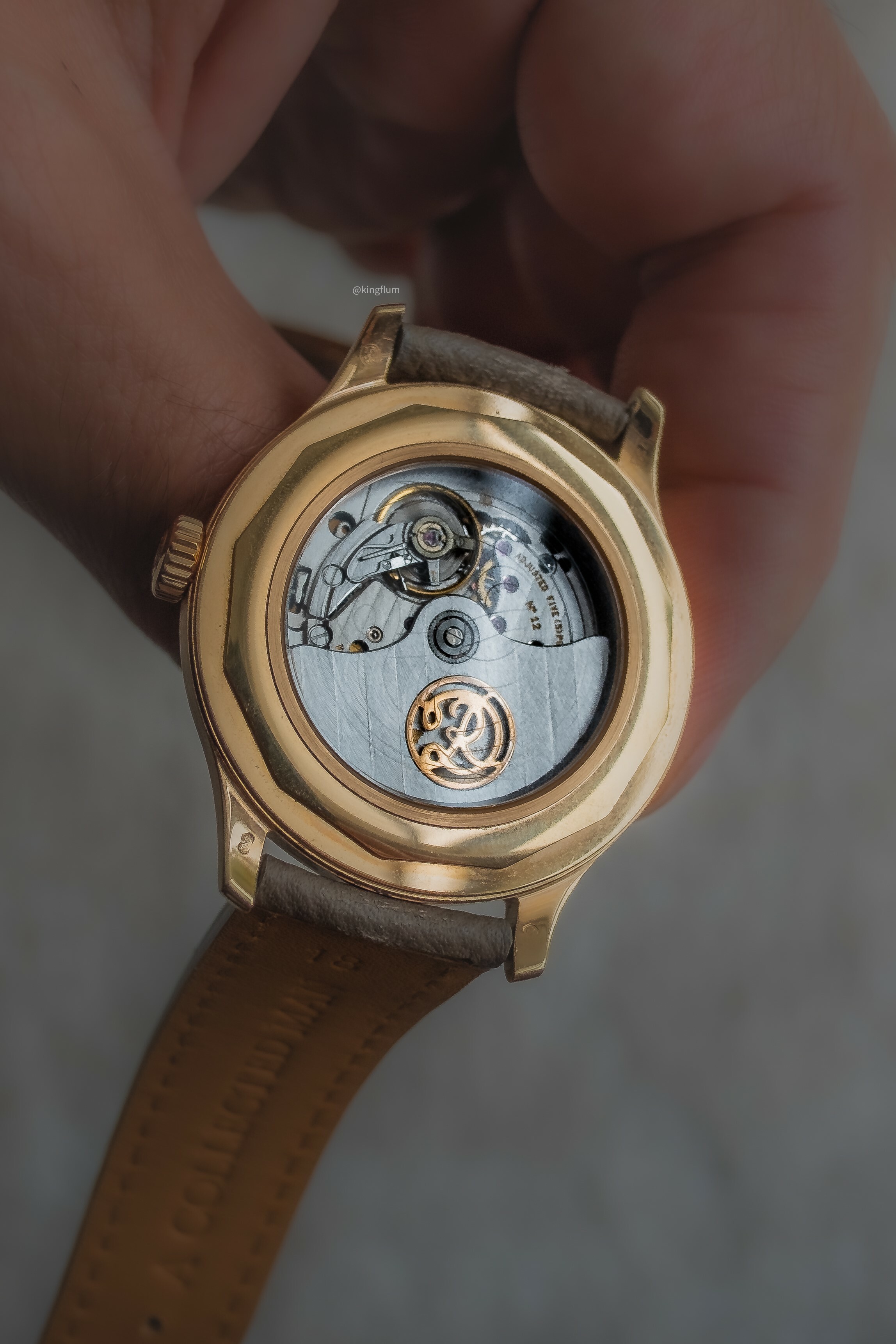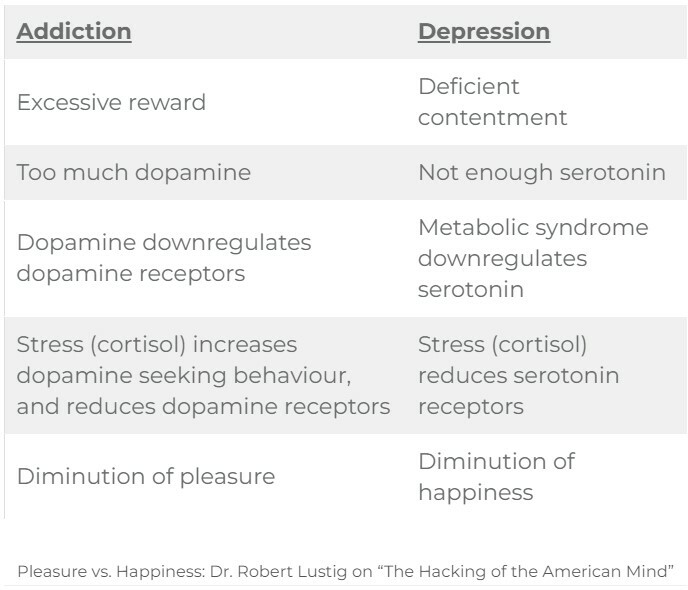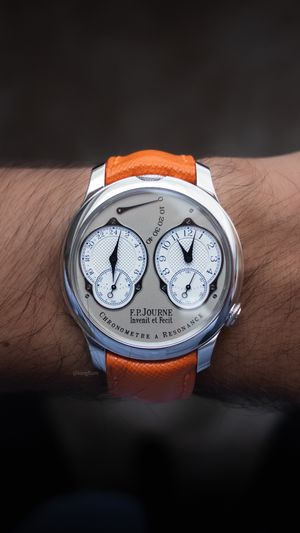
Dr. Robert Lustig, Emeritus Professor at the University of California, wrote a book entitled “The Hacking of the American Mind”. He discusses “Pleasure vs Happiness”… and talks about how these two concepts are VERY different. I will discuss some of his content, and try and relate it to watch collecting.
General recap of Lustig’s messages
So he covers some key messages about the difference between pleasure and happiness, which I will share upfront, and then go into more detail. Lustig states we need a reward system to actually live, and without a reward system, we would not survive as a species. The key thing to remember, he says, is that happiness and pleasure are not the same thing, and he boils down the differences into these seven points:
Pleasure is short-term, happiness is long term.
Pleasure is visceral, happiness is ethereal.
Pleasure is taking, happiness is giving.
Pleasure is achieved alone, happiness is achieved in social groups.
Pleasure is achievable through substances, happiness cannot be achieved by using substances.
Pleasure is addictive in the extreme, happiness is not addictive.
Pleasure is dopamine, happiness is serotonin.
So, going into some of the details… Dopamine and serotonin are two chemicals made by the brain, and they are used to communicate between neurons (brain cells). They also share a tangential relationship with cortisol, when it comes to our hormonal balance, which he talks about later on.
Dopamine is an excitatory neurotransmitter. It says: “this feels good, I want more!” In practice, when this hormone binds to its receptor, the neighbouring receptor is excited by this. Chronic overstimulation, leads to neuronal cell death, because all the neurons get too ‘excited’. In order not to be overwhelmed, the body reduces (downregulates) the number of dopamine receptors, and so, over time, we develop a tolerance to excess dopamine since there are not enough receptors for the hormone to bind with. Naturally, this means that your next hit of dopamine needs to be a bigger one, to feel the same level of rush; In other words, we develop a tolerance to this over time, and eventually, no matter how big a hit we get, we don’t ever feel ay satisfaction. Eventually, as our neurons start to die, that’s called… addiction.
Serotonin, conversely, is an inhibitory neurotransmitter. It says: “this feels good, I don’t want or need any more.” In practice, there is no downregulation of the serotonin receptors, and so, there is never a cause of neuronal cell death. The concepts of happiness and contentment, are not ones which we can ever ‘overdose’ on. We can for example, overdose on dopamine releasing stimulants, but never on excess serotonin. The one thing that can downregulate serotonin receptors, is cortisol, which we will discuss shortly.
The prefrontal cortex (PFC) plays a central role in our cognitive control functions, and dopamine in the PFC modulates cognitive control, thereby influencing attention, impulse inhibition, prospective memory, and cognitive flexibility. This brain region has been implicated in executive functions. Executive function relates to our abilities to differentiate among conflicting thoughts, determine good and bad, better and best, same and different, future consequences of current activities, working toward a defined goal, prediction of outcomes, expectation based on actions, and social “control” (the ability to suppress urges that, if not suppressed, could lead to socially unacceptable outcomes or imprisonment!). In short, when the PFC is operating normally, we don’t do stupid things.
Cortisol, is our stress hormone; and it acts on the pre-frontal cortex. If you are extremely stressed, or have a dysfunctional pre-frontal cortex, you only “live for the moment”, and you don’t think much about the future. This means, when you’re stressed and lack the ability to cognitively inhibit your feeling of reward (because you’re now inclined to do more stupid things) … this drives the dopamine cycle even faster. As you now know from the previous paragraphs, this eventually leads to neuronal cell death. In short, dopamine plus stress, leads to addiction even faster.
The importance of this is quite logical. As you experience chronic stress, this makes you chase ‘reward’ through dopamine. As you chase dopamine, while your PFC is being shut off by the cortisol from stress, this sets you up to seek more… dopamine! You can see how this sets you up for addiction.
But how does cortisol interact with serotonin? As mentioned earlier, Chronic stress, (i.e. cortisol) impacts our serotonin receptors, by downregulating them. So again, this makes intuitive sense – you might recall a time where you were feeling content and relaxed, and suddenly had a stressful emergency in your business or workplace – your cortisol levels went up, and your serotonin receptors were downregulated. Anyway, in the presence of chronic stress (excess cortisol), you have less serotonin getting to work, because the cortisol is downregulating your serotonin receptors; This is called… depression!
The key takeaway at this point, is that addiction and depression are both closely tied to chronic stress. Quick recap:

What is clear from this analysis? The more pleasure you seek, the more unhappy you get.
Lustig’s four c’s to help ourselves:
Connect: The gathering of people, for in-person social interaction. The rationale for this, is that interpersonal connection activates our ‘mirror neurons’ which are responsible for empathy, and empathy is a requirement for serotonin generation! Conversely, social media generates dopamine.
Contribute: This is giving of yourself without any expectations of reward. This includes things like altruism, volunteering, philanthropy or anything which contributes to ‘the greater good’ – all of this generates serotonin, and fosters emotional well-being.
Cope: This is about taking good physical care of ourselves. Sleep deprivation increases cortisol output, and inhibits PFC function. Multitasking also drives up cortisol in almost all people, and only about 2.5% of people can multitask effectively, without triggering the stress hormone. Exercise is found to be as good as SSRIs (antidepressants) in alleviating depression.
Cook: Here he talks about the role of good nutrition when it comes to good brain health… and the idea of cooking a healthy wholesome meal, allows people to connect as they eat together, contribute to their health and cope better. The relationship between nutrition and mental health is a whole separate topic which I would encourage you to research separately.
Conclusion
A lot of this material resonated with me and my own collecting journey. I, like many other friends I have made in this hobby, seem to constantly come back to the mantra “it is not about the watches, it is about the people.” This is also one of the key messages I took away from Lustig’s work in relation to watch collecting… the bursts of dopamine we get from new acquisitions are short-lived, and if we aren’t careful, each successive acquisition can send us down the dark hole of actual addiction. Throw in some stress, and we’re probably moving even further away from happiness than we think.
Beyond the whole dopamine/serotonin debate, there are so many other pieces of evidence in our own hobby. I have, like many others, helped fellow collectors acquire watches which I could otherwise have profited from acquiring (and selling) myself – and choosing to help these collectors land a grail gave me immense happiness. From this, I gained genuine friends, whose company and friendships I continue to enjoy to this day; to me, this is far more valuable than the fleeting pleasure I might have experience by making a quick buck flipping a watch.
Before joining Instagram and connecting with collectors all over the world, this hobby was nowhere near as meaningful to me as it is today. Lustig states that happiness is achieved in social groups, and I could not agree more. In essence, this is how I enjoy collecting now too. Small communities of like-minded friends who all enjoy the hobby, without the undertones of one-upmanship and social status – this is where the true joy of watch collecting lies. I guess what that means is, there is no real ‘grail watch’ at all… just ‘grail collector friends’!
PS. Here are some of my older posts related to happiness if you’re interested:
Watch collecting and happiness
This article was originally posted on 5 October 2022, by ScrewDownCrown.
